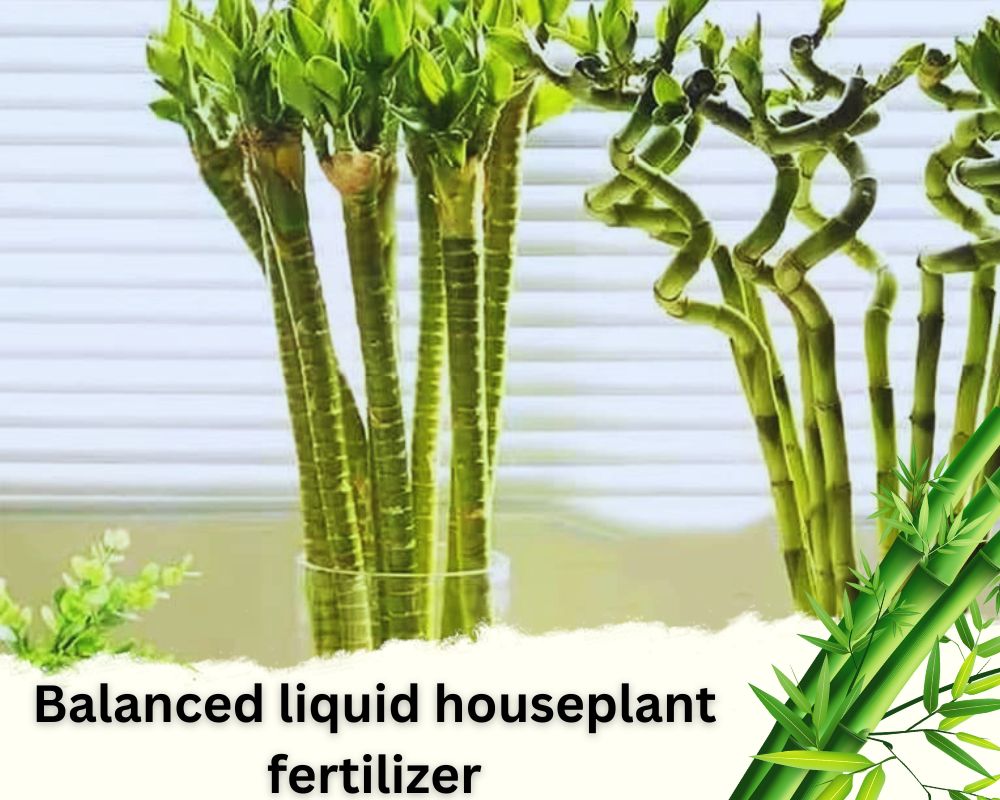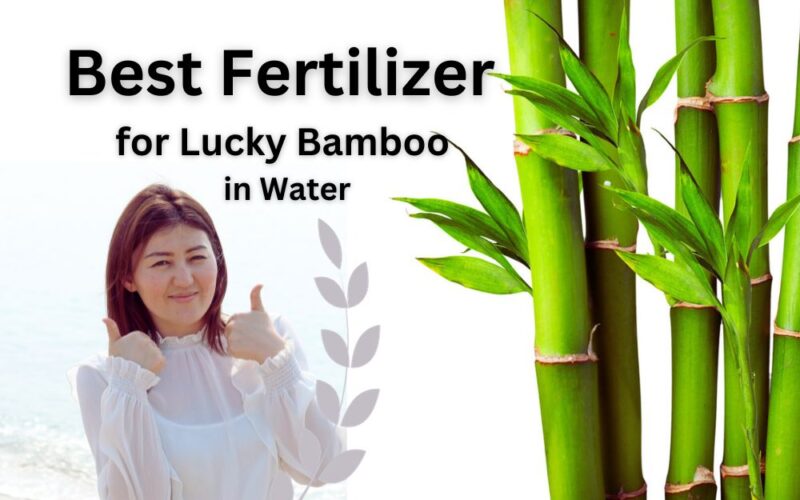Here you will find the best fertilizer for lucky bamboo in water including natural, chemical, and homemade along with their benefits for your lucky bamboo and pro tips for using them.
Lucky bamboo, also known as Dracaena sanderiana, is one of the popular indoor bamboo types that can be grown in both soil and water. I love it due to it is an easy-growing bamboo houseplant with an appealing view that is used in Feng Shui.
As I told you in my previous article about bamboo houseplant care, it doesn’t require much fertilizer. However, providing some nutrients can help promote the healthy growth of your lucky bamboo. I discussed the best fertilizer for lucky bamboo in the soil in my other post, here I provide you with the best options for fertilizing lucky bamboo in water, keep reading.
➡ You can also hear the audio version of this article.
Natural Fertilizer for Lucky Bamboo in Water: Liquid Seaweed Fertilizer

If you a fan of using a natural and eco-friendly fertilizer for lucky bamboo in water, here I want to tell you about one of the best natural fertilizers for lucky bamboo that you can use in water-based environments too: Liquid seaweed fertilizer
This is an organic fertilizer that is derived from seaweed. Do you know what is seaweed? It is a marine plant that is also known as algae. It turns into Liquid seaweed fertilizer after has been harvested from the ocean and processed into a liquid form. Now let to find its benefits for your lucky bamboo.
Benefits of Using a Liquid Seaweed Fertilizer for a Lucky Bamboo Plant in Water
- Seaweed contains several essential plant nutrients, including nitrogen, phosphorus, and potassium, as well as trace elements such as iron, zinc, and magnesium.
- It also contains natural growth hormones, including auxins, cytokinins, and gibberellins, which can help stimulate plant growth and development.
- It can be easily absorbed by plants through their leaves and roots. When applied to the soil or water, the nutrients and growth hormones are quickly taken up by the plant, promoting healthy growth and development.
- Seaweed has natural antifungal and antibacterial properties that can help protect plants from diseases.
How to Use a Liquid Seaweed Fertilizer for Lucky Bamboo in Water
- Dilute the fertilizer for lucky bamboo in water according to the manufacturer’s instructions.
- Add it to the water every 2-4 weeks.
- It’s important not to over-fertilize, as this can cause damage to the plant.
- Always follow the recommended dosage and frequency of application.
Best Fertilizer for Lucky Bamboo in Water: Balanced liquid houseplant fertilizer

If you prefer to use chemical fertilizer for lucky bamboo in water, keep reading to learn one of the best ones: Balanced liquid houseplant fertilizer.
Balanced liquid houseplant fertilizers contain a balanced mix of essential nutrients (NPK) that the lucky bamboo needs for its optimal growth and development. let to tell you some points to use it.
How to Use a Balanced Liquid Houseplant Fertilizer for Lucky Bamboo Plants in Water?
Here, I provide you with 4 golden tips that will help you to use a balanced liquid houseplant fertilizer correctly. let’s find them.
Consider the Nutrient Content of your Balanced Liquid Houseplant Fertilizer
The best fertilizer for lucky bamboo in water must have a balanced mix of:
- Primary macronutrients (nitrogen, phosphorus, and potassium)
- Secondary macronutrients (calcium, magnesium, and sulfur)
- Trace elements (iron, zinc, manganese, copper, molybdenum, and boron).
Always Dilute your Balanced Liquid Houseplant Fertilizer:
As I told you in my previous article about how to fertilize lucky bamboo in water, over-fertilizing can be harmful to lucky bamboo, especially its roots. So, it’s important to use the correct amount of your fertilizer for lucky bamboo in water.
To do it, you must follow the instructions provided by the manufacturer to determine the appropriate dilution ratio for your specific fertilizer.
Choose the Best Timing and Frequency
- I often recommend fertilizing lucky bamboo every 2-4 weeks during the growing season (spring and summer).
- You must reduce or stop fertilizing during the dormant season (fall and winter) to decrease the risk of over-fertilization.
- Please avoid getting the fertilizer on the leaves or stems, as this can cause damage or burning.
Check the Water Quality to Dilute your Fertilizer
Finally, It is important to use clean, dechlorinated water for diluting the fertilizer. Please note that Chlorine and other chemicals in tap water can be harmful to the lucky bamboo and also may affect nutrient uptake.
Best plant food for bamboo in water: Hydroponic Nutrient Solution

You can also use a hydroponic nutrient solution specifically formulated for plants grown in water. These solutions contain a balanced mix of nutrients required by the plants. Follow the instructions on the package for dilution and application frequency.
Please note that the composition of a hydroponic nutrient solution can vary depending on the specific brand or formulation. Select one that contains a balanced combination of:
- Primary macronutrients (nitrogen, phosphorus, and potassium)
- Secondary macronutrients (calcium, magnesium, and sulfur)
- Trace elements (iron, zinc, manganese, copper, molybdenum, and boron).
How to Use a Hydroponic Nutrient Solution for a Lucky Bamboo Plant in Water?
- As you know the nutrient solution is usually available in concentrated form, so you must dilute it with water before applying it as a fertilizer for lucky bamboo in water. To do it well, follow the instructions provided by the manufacturer.
- You must consider the pH level and electrical conductivity (EC) of the nutrient solution. The best pH levels are typically between 5.5 and 6.5.
- Do you know what are EC levels? They indicate the concentration of dissolved nutrients in the solution. It is important to show you whether the plants are receiving the correct amount of nutrients are not.
- You must replace the nutrient solution periodically to maintain its freshness. It also prevents the buildup of salts or imbalances in nutrient concentrations.
Benefits of Using a Hydroponic Nutrient Solution for a Lucky Bamboo Plant in Water
- This fertilizer for lucky bamboo in water can be easily absorbed by plants’ root systems so they are a readily available source of nutrients.
- They are typically water-soluble, allowing for efficient nutrient uptake and minimizing the risk of nutrient deficiencies or imbalances.
Homemade Fertilizer for Bamboo Plants in Water: Fish Tank Water

Do you have an aquarium with fish in your house? great! You can use the fish tank water as a Lucky Bamboo fertilizer homemade to fertilize your lucky bamboo. It is an effective and natural way to provide nutrients for your indoor bamboo plant.
However, there are several points that you must consider before using this homemade fertilizer for lucky bamboo in water.
How to Use Fish Tank Water Fertilizer for Lucky Bamboo in Water?
There are points that you must consider before using fish tank water as a fertilizer for lucky bamboo in water. in the following, I will provide you with 5 golden tips.
Consider the Nutrient Content of Your Fish Tank Water
As you know fish waste contains organic matter and nutrients such as:
- Nitrogen
- Phosphorus
- Potassium
The good news is that they are essential nutrients for promoting healthy foliage and the overall development and growth of your lucky bamboo. But as I told you before, lucky bamboo needs a balanced mix of nutritious. Is Fish tank water a balanced fertilizer? How you can find out?
Be Cautious about Ammonia Levels
You must monitor the ammonia levels in the fish tank water. do you know why? because Ammonia is toxic to lucky bamboo in high concentrations. So, if the ammonia levels are too high you must avoid using the fish tank water as fertilizer. Do you know how you can measure the ammonia levels in water?
Always Dilute the Fish Tank Water
To prevent over-fertilization, it’s important to dilute the fish tank water before using it. the best way to do it is to dilute the fish tank water with clean, dechlorinated water at a ratio of 1 part fish tank water to 3 parts clean water.
Fertilize at the Best Timing and Frequency
I usually recommend adding the diluted fish tank water to the water in the lucky bamboo container every 2-4 weeks. So, you will add a steady supply of nutrients without causing excessive buildup or water contamination.
Check the Water Quality
You must ensure that the fish tank water is high quality, which must be without any heavy contamination. Regular maintenance of the fish tank, including proper filtration and water changes, is crucial to maintain a healthy environment for both the fish and the plant.
Conclusion
Here, I tried to show you the best fertilizer for lucky bamboo in water. I provided you with chemical, natural, and homemade fertilizers that can promote healthy growth of your indoor bamboo plant and also are usable for water-based environments and hydroponic cultures with proper tips to use them.
Do you prefer to use natural or chemical fertilizers? Why? Do you think homemade fertilizers can work well? I ask you some questions in the above article, do you know the answers? Please share your ideas below this page.

Elahe Rabiei
Hi, I’m Elaheh. My Academic major is plant protection, and houseplants are my expertise. As a houseplant lover, my house is full of indoor plants and it is my passion to take care of them. Hence, I’m here to share my knowledge and experience about growing healthy houseplants. I am also a plant protection advisor, so feel free to ask me any questions you may have.

